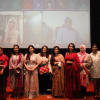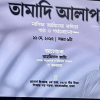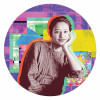‘Trigger Warning: Dark Romance’: Exploring the world of dark tropes and taboo with Sister Library

Sister Library, often in association with Bookworm Bangladesh and Star Books and Literature, has been hosting a wide range of events as of late—each holding discussions on a topic more unique than its predecessor. So, it was about time their heads turned to the enigmatic, tantalising, yet oddly rarely talked about world of dark romance. On January 11, Sister Library with Bookworm Bangladesh, organised "Trigger Warning: Dark Romance" with the intent of fostering discussions around dark romance, erotic literature, everything in between, and everything beyond.
The emergence of dark romance's popularity here in Bangladesh is perhaps a story told best by the owner of Bookworm herself, Amina Rahman. According to her, readers would often flock to her store, asking if there were any books under the genre of "dark romance". Curious, Amina would then proceed to explore this world herself, which eventually led to her discovering Shanjida Nusrath Ali, a dark romance author based in Dhaka.
Shanjida, with eight self-published novels according to Goodreads, has made a name for herself in the world of dark romance. But the question remains, what is dark romance? How does it differ from any other genre of romance in literature? And is there really a scene for dark romance here in Bangladesh? The event took a deep dive into all of these questions and more.
The session kicked off with a discussion amongst the most diverse panel one could imagine. Consisting of Dr Nazia Manzoor, Editor of Star Books and Literature and Chair of the Department of English and Modern Languages, NSU; Dr Kaiser Huq, renowned academic, translator, and poet; Shanjida Nusrath Ali, author of dark romance; and Shahriar Shaams, writer and critic. With a panel as unique as this, the conversations were, expectedly, varied. Starting off from the need to understand what dark romance even is, author Shanjida took the responsibility of introducing its nature to everyone attending.
Dark romance exists primarily as a subgenre of romance, exploring aspects that many may consider extreme, or even taboo. The tropes it tends to follow are offshoots of the types of stories that may be found on Wattpad or Archive of Our Own, and in fact, according to Shanjida, this is where many authors find their start, eventually blossoming into published writers themselves. Shanjida's trajectory was quite similar, but what's interesting to note here is what informs her writing. To a question asked by Shahriar Shaams regarding the nature of the characters and their tendency to be westernised, Shanjida responded by saying, "When I first started writing Dark Romance stories, nobody in Bangladesh was reading this. As a result, I never wrote for Bangladesh. It was only after some readers reached out to me that I realised there was a growing reader base here. I want to someday write stories that will feature Bangali characters, but there's also the risk of controversy that might invite." She lamented, indicating the truth of the literary world in Bangladesh, the fact that reading any sort of literature that may pertain to some sort of eroticism is typically looked down upon.
After this, the conversation veered into the difference between dark romance and the regular type of romance. Both Dr Kaiser Huq and Dr Nazia Manzoor brought up classical romance stories and the extremities contained within them. In addition, Dr Kaiser Huq raised questions regarding the similarities between dark romance and other forms of erotic literature, whereas Dr Nazia Manzoor pointed out the fact that dark romance is, as it stands today, largely female-dominated.
"The reason why dark romance draws you is because it often deals with female desire. When women want to take control of their desire, and it is in the shape of darkness, what stories can you find then?" She asked.
The audience, too, was lively. Consisting of readers of dark romance, as well as those who took an interest in the genre, it took the shape of young people as well as old, including some who were active freedom fighters. The engagement from readers of all ages was a warm welcome, as it displayed a curiosity that is much needed in exploring the world of literature.
The session capped off neatly with Shanjida's mother standing up to speak about her experience with her daughter's writing: "I am proud that my daughter is creating. There is good and there is bad, but it's up to you what you take from it. But she is creating." The session ended on this warm note, reminding us of the importance of creation.
Raian Abedin is a poet, a student of Biochemistry, and a contributor to The Daily Star.

 For all latest news, follow The Daily Star's Google News channel.
For all latest news, follow The Daily Star's Google News channel. 








Comments